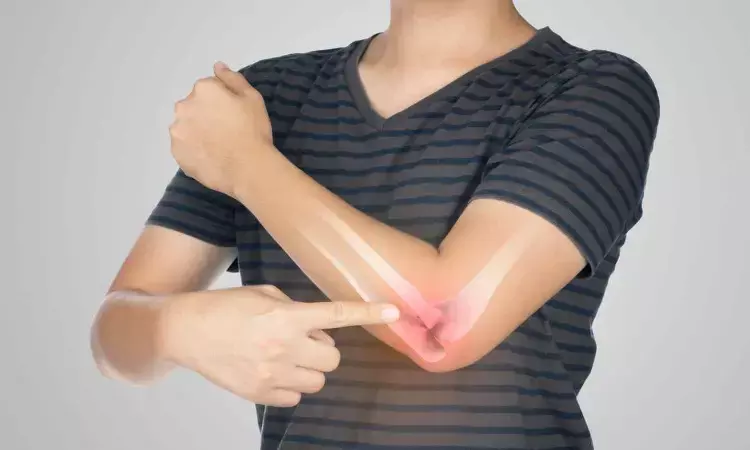- Home
- Medical news & Guidelines
- Anesthesiology
- Cardiology and CTVS
- Critical Care
- Dentistry
- Dermatology
- Diabetes and Endocrinology
- ENT
- Gastroenterology
- Medicine
- Nephrology
- Neurology
- Obstretics-Gynaecology
- Oncology
- Ophthalmology
- Orthopaedics
- Pediatrics-Neonatology
- Psychiatry
- Pulmonology
- Radiology
- Surgery
- Urology
- Laboratory Medicine
- Diet
- Nursing
- Paramedical
- Physiotherapy
- Health news
- Fact Check
- Bone Health Fact Check
- Brain Health Fact Check
- Cancer Related Fact Check
- Child Care Fact Check
- Dental and oral health fact check
- Diabetes and metabolic health fact check
- Diet and Nutrition Fact Check
- Eye and ENT Care Fact Check
- Fitness fact check
- Gut health fact check
- Heart health fact check
- Kidney health fact check
- Medical education fact check
- Men's health fact check
- Respiratory fact check
- Skin and hair care fact check
- Vaccine and Immunization fact check
- Women's health fact check
- AYUSH
- State News
- Andaman and Nicobar Islands
- Andhra Pradesh
- Arunachal Pradesh
- Assam
- Bihar
- Chandigarh
- Chattisgarh
- Dadra and Nagar Haveli
- Daman and Diu
- Delhi
- Goa
- Gujarat
- Haryana
- Himachal Pradesh
- Jammu & Kashmir
- Jharkhand
- Karnataka
- Kerala
- Ladakh
- Lakshadweep
- Madhya Pradesh
- Maharashtra
- Manipur
- Meghalaya
- Mizoram
- Nagaland
- Odisha
- Puducherry
- Punjab
- Rajasthan
- Sikkim
- Tamil Nadu
- Telangana
- Tripura
- Uttar Pradesh
- Uttrakhand
- West Bengal
- Medical Education
- Industry
Pioneering Zinc-based dissolvable implants Stronger, safer, smarter for bone repair: Study

Monash research could transform how broken bones are treated, with the development of a special zinc-based dissolvable material that could replace the metal plates and screws typically used to hold fractured bones together.
Surgeons routinely use stainless steel or titanium, which stay in the body forever, can cause discomfort and may require follow-up surgeries.
A new zinc alloy, designed by Monash biomedical engineers, could solve these problems by being mechanically strong but gentle enough to degrade safely over time while supporting optimal healing.
A study published today in Nature shows the research team's innovative approach to making the zinc alloy as strong as permanent steel implants and more durable than other biodegradable options like magnesium-based implants.
Lead researcher, Professor Jian-feng Nie, from the Department of Materials Science and Engineering, said the innovative material had the potential to transform orthopaedic care by reducing complications, minimising the need for additional surgeries, and offering a sustainable alternative to permanent metallic implants.
"Our zinc alloy material could revolutionise orthopaedic care -- opening the door to safer, smaller implants that not only enhance patient comfort but also promote better healing outcomes by minimising disruption to surrounding tissues," Professor Nie said.
"An implant that never disappears will always be a risk to the patient. On the other hand, one that degrades too fast won't allow adequate time for the bones to heal. With our zinc alloy material, we can achieve the optimal balance between strength and controlled degradation of the implant to promote better healing."
The research shows that by engineering the siNatureze and orientation of the material's grains, the zinc alloy can bend and adapt in unique ways to accommodate the shapes of its neighbouring tissues.
"This made it not only stronger but more flexible, offering a game-changing alternative for orthopaedics," Professor Nie said.
The research is paving the way for a new start-up to be launched out of Monash University with a focus on developing next-generation biodegradable implants.
Reference:
Chengcheng Wu, Fengxiang Lin, Hong Liu, Matthew H. Pelletier, Max Lloyd, Williams R. Walsh, Jian-Feng Nie. Stronger and coarser-grained biodegradable zinc alloys. Nature, 2025; DOI: 10.1038/s41586-024-08415-8
Dr Kamal Kant Kohli-MBBS, DTCD- a chest specialist with more than 30 years of practice and a flair for writing clinical articles, Dr Kamal Kant Kohli joined Medical Dialogues as a Chief Editor of Medical News. Besides writing articles, as an editor, he proofreads and verifies all the medical content published on Medical Dialogues including those coming from journals, studies,medical conferences,guidelines etc. Email: drkohli@medicaldialogues.in. Contact no. 011-43720751


